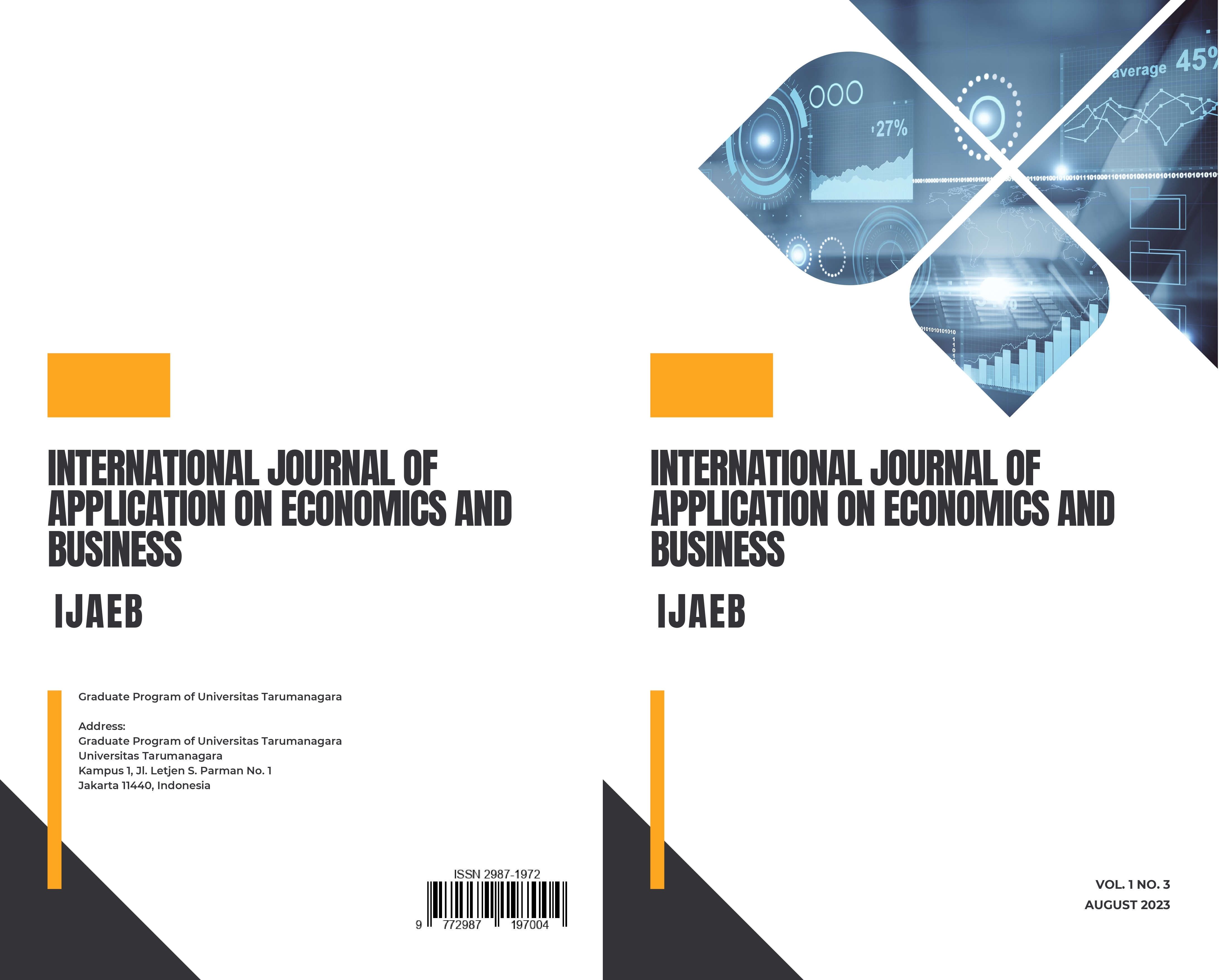THE EFFECT OF EMPATHY AND PREVIOUS EXPERIENCES ON SOCIAL ENTREPRENEUR BEHAVIOR WITH SELF-EFFICACY, OUTCOME EXPECTATIONS AND SOCIAL SUPPORT AS MEDIATOR IN JAKARTA
Main Article Content
Abstract
This study aims to empirically examine the effect of empathy and prior experience on social entrepreneurial behavior with self-efficacy, outcome expectation and perceived social support as mediator. The sampling technique used in this research is non-probability sampling using convenience sampling technique. Data collection using a google form questionnaire distributed through social media with a total of 200 respondents. Data processing in this study using SmartPLS software version 3.2.9. The sample in this study is social entrepreneur who live in Jakarta. The results of the analysis of this study are: 1) self-efficacy can positively and significantly effect on social entrepreneurial behavior, 2) outcome expectation can positively and significantly effect on social entrepreneurial behavior, 3) perceived social support can positively and significantly effect on social entrepreneurial behavior, 4) empathy can positively and significantly effect on social entrepreneurial behavior with self-efficacy, outcome expectation and perceived social support, 5) prior experience can positively and significantly effect on social entrepreneurial behavior with self-efficacy, outcome expectation and perceived social support.
Article Details
Section

This work is licensed under a Creative Commons Attribution-NonCommercial-ShareAlike 4.0 International License.
This journal provides immediate open access to its content on the principle that making research freely available to the public supports a greater global exchange of knowledge.
IJAEB by Graduate Program of Universitas Tarumanagara is licensed under a Creative Commons Attribution-NonCommercial-ShareAlike 4.0 International License.. Permissions beyond the scope of this license may be available at https://journal.untar.ac.id/index.php/ijaeb
References
Araştırma, Ü. B. (2017). The Effect of Perceived Social Support on Social Entrepreneurship. A Research on University Students, 8(3), 519–532.
Ip, C. Y., Zhuge, T., Chang, Y. S., Huang, T., & Chen, Y. (2022). Exploring the Determinants of Nascent Social Entrepreneurial Behaviour.International Journal of Environmental Research and Public Health, 19(6), 3556. https://doi.org/10.3390/ ijerph19063556
Yujuico, E. (2008). Connecting the dots in social entrepreneurship through the capabilities approach. Socio-Economy Review, 6(3), 493–513. http://dx.doi.org/10.1093/ ser/mwn003.
Alvord, S. H., Brown, L. D., &Letts, C. W. (2004). Social entrepreneurship and societal transformation: An exploratory study. The Journal of Applied Behavioral Science, 40(3), 260–282.
Redmond, B. F. (2010). Self-efficacy theory: Do I think that I can succeed in my work? Work Attitudes and Motivation. Pennsylvania State University. https://cms.psu.edu.
Toepfer, S. M. (2010). Family social support and family intrusiveness in young adult women. Family Science Review, 15(2), 57-65.
Davis, M.H. (2015). Empathy and Prosocial Behavior. Oxford University Press, New York, NY, 282-306.
Hockerts, K. (2017). Determinants of social entrepreneurial intentions. Entrepreneurship Theory and Practice, 41, 105–130.
Kast, F.E. and. Rosenzweig, J.E. 2005. Organization and Management: A Systems and Contingency Approach. New York: McGraw-Hill Book Company.
Boluk, K.A. & Mottiar, Z. (2014). Motivations of social entrepreneurs: blurring the social contribution and profits dichotomy. Social Enterprise Journal, 10(1), 53-68.
Drayton, W. (2002). The Citizen Sector: Becoming as Entrepreneurial and Competitive as Business. California Management Review, 44 (3), 120–132.
Urban, B. (2015). Evaluation of social enterprise outcomes and self-efficacy. International Journal of Social Economics, 42, 163–178.
Vanevenhoven, J. & Liguori, E. (2013). The impact of entrepreneurship education: introducing the entrepreneurship education project. Journal of Small Business Management, 51(3), 315-328.
Sarason, I. G., Levine, H. M., Basham, R. B., & Sarason, B. R. (1983). Assessing social support: The social support questionnaire. Journal of Personality and Social Psychology, 44(1), 127-139.
Urban, B. (2015). Evaluation of social enterprise outcomes and self-efficacy. International Journal of Social Economics, 42, 163–178.
Lent, R. W. & Brown, S. D. (2008). Social cognitive career theory and subjective wellbeing in the context of work. Journal of Career Assessment, 16(1), 6–21.
Baron, R.A. & Markman, G.D. (2000). Beyond social capital: How social skills can enhance entrepreneurs’ success. Academy of Management Perspectives, 14, 106–116.
Bacq, S. & Alt, E. (2018). Feeling capable and valued: A prosocial perspective on the link between empathy and social entrepreneurial intentions. Journal of Business Venturing, 33, 333–350.
Bandura, A. (1986). Social foundation of thought and action: A social cognitive theory. Englewood Cliffs, NJ: Prentice Hall.
Lazarus, R.S. (1991). Cognition and motivation in emotion. American Psychologist, 46(4), 352-367. doi: 10.1037/0003-066X.46.4.352.
Mair, J. & Noboa, E. (2006). Social entrepreneurship: How intentions to create a social venture are formed. Dalam Mair, J., Robinson, J., Hockerts, K.N., &Eds.In Social Entrepreneurship (h. 121-135). Palgrave MacMillan: Basingstoke, UK.
Rittenour, C.E. &Martin, M.M. (2008). Convergent validity of the communication based emotional support scale. Communication Studies, 59(3), 235-241. doi: 10.1080/ 10510970802257671.
Reis, H.T. &Collins, N. (2000). Measuring relationship properties and interactions relevant to social support. Dalam Cohen, S., Underwood, L.G., & Gottlieb, B.H. (Eds). Social Support Measurement and Intervention (h. 136-192). Oxford University Press. doi: 10.1093/med:psych/ 9780195126709.003.0005.
Minniti, M. & Bygrave, W. (2001). A dynamic model of entrepreneurial learning. Entrepreneurship Theory and Practice, 25(3), 5–16.
Hussein, R., Mohamed, N., Ahlan, A.R., & Mahmud, M. (2010). E-Government Application: An Integrated Model on G2c Adoption of Online Tax. Transforming Government: People, Process, and Policy, 5(3), 225-248.
Sekaran, U. & Bougie, R.J. (2016). Research Methods for Business: A Skill Building Approach. 7th Edition, John Wiley & Sons Inc. New York, US.
Chin, W. W. (1998). The Partial Least Squares Approach to Structural Equation Modeling. Modern Methods for Business Research, 295-336.
Sarstedt, M., Hair, J., & Ringle, C. M. (2017). Partial least square structural equation modeling. Springer International Publishing, 13, 1-41. doi: https://doi.org/10.1007/978-3-319-05542-8_15-1.
Hair, J.F., Ringle, C.M., & Sarstedt, M. (2011). PLS-SEM: Indeed a silver bullet. Journal of Marketing, 19, 139–152.
Akter, A., Rana, S.M.S., & Ramli, A.J. (2020). Factors influencing social entrepreneurial behavior: Evidence from a developing nation. International Journal of Ethics and Systems, 36, 581–599.
Liguori, E.W., Bendickson, J.S., & McDowell, W.C. (2018). Revisiting entrepreneurial intentions: a social cognitive career theory approach. International Entrepreneurship and Management Journal, 14(1), 67-78.
Ashraf, M.A. (2021). Is Old Gold? The role of prior experience in exploring the determinants of Islamic social entrepreneurial intentions: Evidence from Bangladesh. Journal of Social Entrepreneurship, 12, 265–290.

